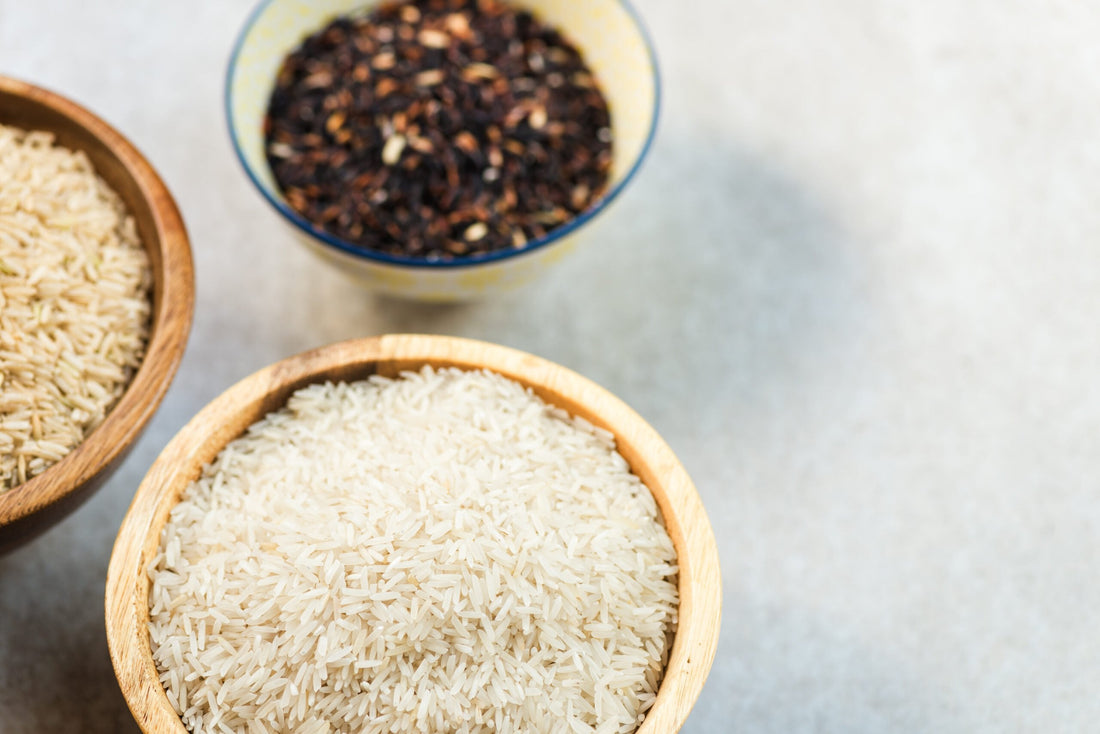Knowledge
Basmati Rice: White vs. ComprehensiveWhite Basmati Rice
White basmati rice is a variety of rice famous for its mild flavor, fluffy texture, and long grains . Native to the mountainous regions of the Himalayas, this rice is an essential ingredient in many cuisines around the world, especially in India and Pakistan. Before reaching our tables, white basmati rice goes through a refining process that improves its appearance and texture.
The white basmati rice refining process includes several important steps:
- Hull Removal : First, the outer hull of the grain is removed, leaving the brown rice grain.
- Polishing and Blanching : The grain is then polished and bleached to remove the bran and germ, leaving only the starchy endosperm, which is what gives rice its characteristic white color and light, fluffy texture.
In addition to being visually attractive, white basmati rice has a number of nutritional and flavor characteristics that make it very popular:
-Low in fat: Naturally low in fat, white basmati rice is an excellent choice for low-fat diets.
-Source of energy: Due to its high carbohydrate content, white basmati rice is an excellent source of quick and sustained energy.
-Low sodium content: Being naturally low in sodium, it is suitable for people who need to control their salt intake.
-Digestibility: It is easy to digest and generally less constipating than other types of rice.
-Taste and aroma: Its distinctive flavor and characteristic nutty aroma make it ideal for a variety of international dishes, from biryanis to pilafs and rice salads.
Approximate nutritional value (per 100 grams of cooked white basmati rice):
- Calories: 130 kcal
- Protein: 2.4 g
- Fat: 0.4 g (of which saturated fat: 0.1 g)
- Carbohydrates: 28 g
- Fiber: 0.4g
- Sugars: 0 g
- Sodium: 1 mg
- Iron: 0.2 mg
- Calcium: 10 mg
- Potassium: 35 mg
Other components:
Vitamins : Contains small amounts of several B vitamins, such as niacin (B3), thiamine (B1) and vitamin B6.
Minerals : In addition to calcium, iron and potassium, it contains traces of magnesium, phosphorus and zinc.
Glycemic index : Basmati rice has a moderate glycemic index, meaning it raises blood sugar levels more slowly compared to other types of white rice.

Brown Basmati Rice
On the other hand, brown basmati rice is a much more nutritious option compared to white basmati rice. This type of rice keeps the bran and germ intact, giving it a brown color and a more fibrous, chewy texture. By preserving these parts of the grain, brown basmati rice retains a greater amount of essential nutrients and antioxidants. This rice also comes from the Himalayan regions and is prized for both its flavor and health benefits.
Brown basmati rice has several important nutritional and health benefits:
-High fiber content: The presence of bran makes brown basmati rice have a higher fiber content, which helps digestion and can contribute to a longer feeling of satiety.
-Higher vitamin and mineral content: By not eliminating the bran and germ, brown basmati rice is richer in vitamins and minerals, such as magnesium, phosphorus and B vitamins.
-Lower glycemic index: This rice has a lower glycemic index compared to white rice, which means it has less impact on blood sugar levels. This is particularly beneficial for people with diabetes or those looking to control their glucose levels.

Approximate nutritional value (per 100 grams of cooked brown basmati rice):
- Calories: 111 kcal
- Protein: 2.6 g
- Fat: 0.9 g (of which saturated fat: 0.2 g)
- Carbohydrates: 23 g
- Fiber: 1.8g
- Sugars: 0 g
- Sodium: 5 mg
- Iron: 0.4 mg
- Calcium: 10 mg
- Potassium: 80 mg
- Magnesium: 43 mg
- Phosphorus: 83 mg
- Zinc: 1 mg
Other components:
-Antioxidants: By preserving the bran, brown rice contains antioxidants that are not present in white rice.
-Vitamins of group B: Richer in thiamine (B1), niacin (B3) and vitamin B6 compared to white rice.
Benefits and Considerations:
Higher fiber content: Helps improve digestion and can contribute to a longer feeling of satiety.
Lower glycemic index: Beneficial for controlling blood sugar levels.
Brown basmati rice is an excellent option for those looking for a healthier, more balanced diet, providing more fiber and essential nutrients than white basmati rice. In addition to its health benefits, this rice also offers a distinctive flavor and texture that can enrich a variety of culinary dishes.


